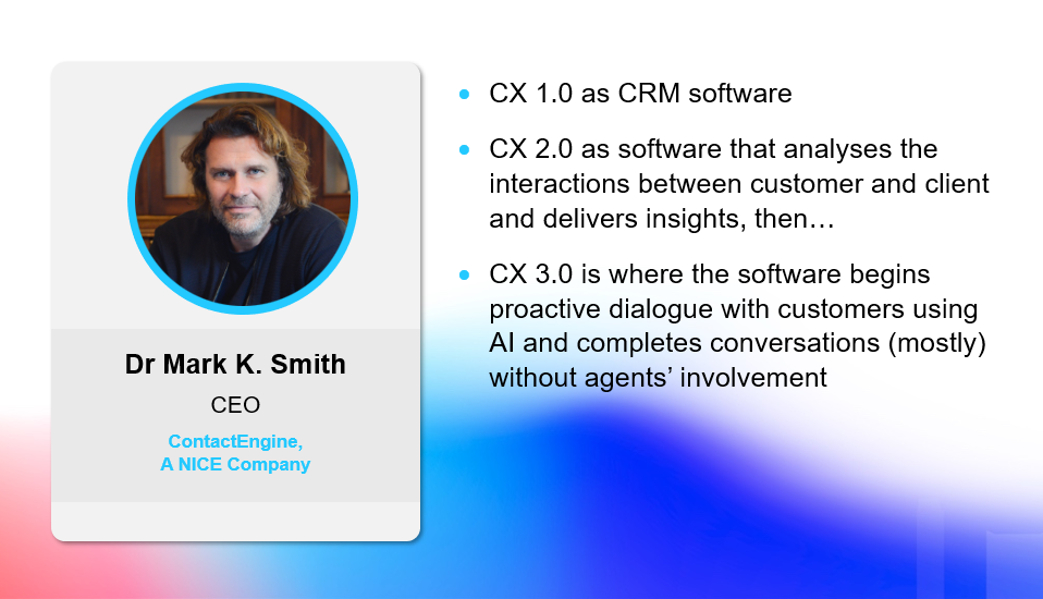In June, NICE hosted two NICE Interactions events for customers and partners, in New York City and London. As with almost all CX technology events in the past six months – including Enterprise Connect 2023 – the topic of artificial intelligence, and especially Generative artificial intelligence (AI)+-, was center stage.
Center stage is meant both figuratively and literally. In New York and London, Barak Eilam, CEO, NICE opened the conference in his inimitable style, wowing the crowds with a 3D presentation over 15 feet high in New York and an only slightly less impressive size in London. But it is not only the sexy visuals that dazzled – it is what Eilam did with those graphics that really impressed.
NICE AI for All
For nearly half of his 30-minute keynote presentation, Eilam explained three Enlighten AI solutions, developed using NICE’s data and domain-trained models, being delivered by the company:
- Enlighten Copilot offers customer service employees a by-their-side conversational AI experience, acting as an empowerment booster, producing accurate, informed, brand-specific, prompts. Enlighten Copilot offers guided interactions, AI-driven personalized coaching and offloading of repetitive tasks.
- Enlighten Autopilot provides a new conversational AI approach to engage consumers based on trusted company knowledge while aligning each response with brand and business goals.
- Enlighten Actions modernizes CX leaders' understanding of their operations and enables them to take action by combining Enlighten's highly specialized AI models for CX, Generative AI technology, and industry benchmarks. Enlighten Actions proactively pinpoints optimal areas for automation and leverages CXone’s suite of applications to carry out the associated activity.
When I say that Eilam explained these new solutions, I don’t mean that he had a slide with the three product names and told the audience to go to breakout sessions for the details. He walked through live-action demos of each solution, using a single customer interaction to show how the three solutions are interrelated, flowing from the customer to an agent to a supervisor.
For example, Eilam explained an Enlighten Actions report that showed that transfer rates were rising in the contact center, i.e., customers were increasingly being transferred from one agent to another. Asking Enlighten Actions why, as a simple English language query, Eilam showed how the contact center manager could learn that WhatsApp interactions were being routed to the wrong queue. Enlighten then suggested adjusting the workflow automatically to correct the problem. What in the past would have been a report merely highlighting a problem becomes a solution that goes on to identify the cause and offer a fix for the issue that can be automatically applied, after human intervention.
I believe that by doing the demos himself, Eilam served to humanize artificial intelligence. There is no doubt that there is as much fear about the potential harm unfettered use of AI can bring to a business as there is excitement about the potential to add automation and intelligence to customer experience interactions. Eilam was saying, by example, that new AI tools are so intuitive that even a CEO can understand how to use them. No data scientist required.
CX: Customer Experience 3.0
The more intimate setting of the London event, with about 1,000 attendees versus over 2,500 in New York, created an opportunity for a unique, interactive keynote session entitled Customer Experience 3.0.
Dr. Mark K. Smith, CEO of ContactEngine, a NICE company, began by explaining his definitions of the three generations of CX, seen in the nearby slide. ContactEngine is a proactive conversational AI company acquired by NICE in 2021. It is no surprise, then, to see that Smith’s definition of CX 3.0 focuses on proactive, versus reactive, dialogues with customers.
The slide below summarizes the components of the session. Smith moderated a mock debate between two NICE customers (who have not permitted their names and companies to be used in the media). One customer took the pro position on each of the statements outlined on the slide and the other the con position. They voiced the rewards and possible concerns with the use of Generative AI in customer experience operations. At the end of each question, Smith threw the question to the audience and estimated what percentage of the audience seemed to agree with the pro or con arguments.
For most questions there was a healthy mix of pro and con responses from the audience – except for one. Not a single audience member raised a hand to agree that Generative AI, “Won’t be used to do bad things.”
I highlight this session as it reinforces my title: thought leadership. NICE is not only acknowledging the pros and cons of Generative AI, but they also used their conference as a forum to create a conversation with users about the challenges they will face.
AI in CX Needs Continued Healthy Debate
My comments should not be taken to imply that I believe NICE is the only company diligently focused on guiding their customers and prospects through the possibilities – pro and con – of artificial intelligence. At similar events in May and June, I found Five9 and Verint customers and partners equally excited about the potential artificial intelligence has to help companies level-up customer experience. The promise of Generative AI in CX is exciting but its deployment will be executed by customer experience executives who appreciate the opportunity to not only learn about solutions but also vet their concerns.












